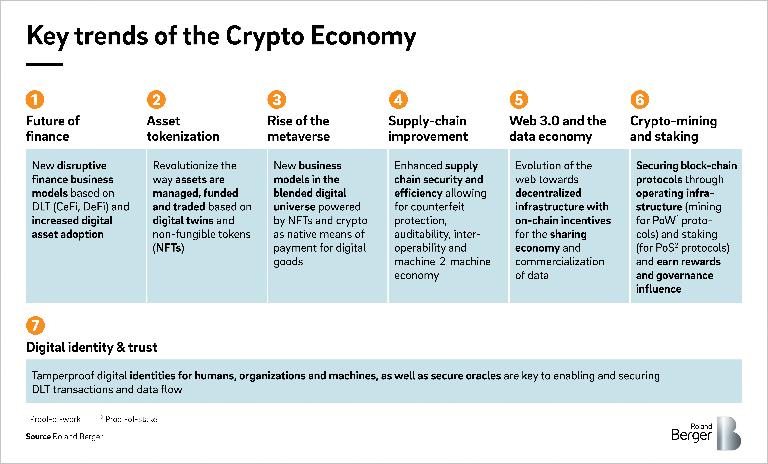This in-depth report determines the potentially disruptive impact of tokenization of assets on the financial trading system.


The rise of the Crypto Economy
Why governments, investment funds and corporates need to define their crypto strategy now
The disruptive potential of Decentral Ledger Technologies and Digital Assets has gone mainstream. At the time of writing this article, the crypto market is valued at over USD 2.5 trillion, numbers more than 12,000 crypto projects, and it's expected to be only the beginning of the growth that’s ahead of us.

The industry has moved on from whitepapers to real-life applications with hundreds of pilot and commercial projects currently being run by world institutions and top private companies (e.g. El Salvador's adoption of Bitcoin, Walmart's food traceability system, J.P. Morgan's Interbank Information Network for cross-border payments and Twitter's BTC adoption). On the funding side, the venture capital industry has poured a record USD 25 bn into crypto investments as of 2021 according to The Block, which is more than the total amount raised in all previous years combined. According to the latest research, the number of Crypto Unicorn companies increased by a whopping 491% in 2021 and M&A activities in the sector are heating up significantly with nearly 200 transactions last year. In short: Crypto is here to stay and will disrupt and improve nearly every industry and sector of our modern society.
Therefore, more and more governments, investment funds and corporates are formulating their crypto economy strategy and making investments to ensure they are well positioned for the future.
In this article, we share the main seven trends that will shape the Crypto Economy and create the need to define specific strategies and readjust business models.
#1 Future of Finance
The institutional and retail adoption of digital assets, new central finance (CeFi) offerings and decentral finance (DeFi) applications are disrupting traditional finance and insurance business models – and in part challenging their very existence:
- Digital asset adoption is increasing exponentially with more and more institutional investors holding digital assets on their balance sheet, major banks issuing dedicated crypto investment reports, several Crypto ETF being issued, merchants accepting crypto and even countries starting to accept cryptocurrency as a legal tender.
- DeFi: The "Uber moment" for the finance and insurance industry has arrived. At the time of writing over USD 250 bn is committed to various DeFi applications from decentral exchanges, lending, crowd funding, insurances and liquidity pools. Not only do these applications eliminate the middleman, the rewards for liquidity providers in this ecosystem are north of 5% APY – outperforming traditional banking and further accelerating adoption.
- CeFi: Centralized crypto-based financial (CeFi) ecosystems offer custodian solutions, crypto-backed credit and debit cards and easy-to-use interfaces that blend the fiat/crypto universe and make it easier for non-crypto audience to get engaged.
We are witnessing the disruption of the way governments, companies and people interact with financial products . While some industries will be more impacted than others, the "future of finance" will affect nearly every sector.
Top 3 sectors to be impacted: Finance, Insurance, Government
#2 Asset Tokenization
The concept of asset tokenization refers to digitalizing real-world assets and the ability to fractionalize their ownership. Fractionalized ownership, when formalized can also be traded in an open marketplace thereby creating flexibility and liquidity for owners of such tokens. It represents a paradigm shift of how assets can be managed, traded and funded for most of the world's asset classes – from industry and energy infrastructure to real estate and art. In short, all tangible and intangible assets can be tokenized. Tokenization increases operational efficiency, transparency and liquidity, and lowers the entry barriers for investors. In addition, tokens can be attributed with the related benefits and derivates that come with the asset, e.g. profit, dividends, voting rights or environmental attributes (which can be a key driver for ESG-related activities).
The main impact will be on sectors that deal with asset management today, however it has the potential to open a bottom-up revolution for asset funding that previously might have not been relevant for traditional asset managers.
Tokenization – through the concept of non-fungible tokens (NFTs) – is also an amplifier for most of the other trends.
Top 3 sectors to be impacted: Finance, Energy, Real Estate
#3 Rise of the Metaverse
In short, the Metaverse describes the virtual space in the digital world. In purely digital spaces but also in the blended augmented reality where physical and virtual worlds collide. The amount of time spent in digital worlds has increased significantly during the last five years and the market for digital goods like in-game items, digital art, virtual real estate and vanity items is booming.
Crypto is the native currency of the digital space and the ability to create non-fungible tokens (NFTs) has further accelerated the development. OpenSea, the largest marketplace for non-fungible tokens, or NFT, recorded a USD 3.4 bn transaction volume on Ethereum in August 2021, more than 10 times the value in July. In addition, crypto gaming investments accounted for 9% total funding in the gaming industry in 2021 and rising.
Digital items in the form of NFTs are becoming the norm for consumers and even high-class consumer brands creating and selling digital items (e.g. Dolce & Gabbana and Rolls-Royce). Businesses not only need to be prepared for significant revenue streams in the metaverse but also a growing expectation of being present in the metaverse.
The race between a centralized and decentralized Metaverse has already begun with tech giant Facebook announcing its strategic repositioning and rebranding to become a dominant Metaverse player, Outlier Ventures and others working on the Open Metaverse OS.
Top 3 sectors to be impacted: Gaming/Entertainment, Fashion/Consumer Goods, Social Media
#4 Supply Chain Improvements
The unique ability of distributed ledger technology to create immutable trustless handover between different interfaces creates significant improvement potential for companies' operations and supply chains. In combination with oracles (entry point for real world data to the blockchain ), supply chain security can be improved to enable counterfeit protection and critical supply chain requirements (e.g. cooling-chain, authorized interfaces etc.). Apart from track-and-trace improvements, blockchain solutions also allow for interoperability between different logistic systems, auditability and machine-to-machine transactions.
Top 3 sectors to be impacted: Logistics, Healthcare, Consumer goods
#5 Web3 and the Data Economy
The term Web3 describes the evolution of the current – mainly centralized and platform-based - web towards a decentralized network-based web powered by a crypto-based value exchange model. Web3 applications change the way infrastructure and data are stored and shared. Companies like Helium are revolutionizing the sharing of connectivity infrastructure and companies like Ocean Protocol are aiming to revolutionize the way data is shared and processed, aiming to unlock the potential of data outside of the centralized FANG data pools. Web3 will therefore not only create new business models, it will also accelerate the transition to a true sharing economy and a potential bottom-up empowerment for smart cities.
Top 3 sectors to be impacted: Data-driven Businesses, Social Media, Ecommerce
#6 Crypto-Mining and Staking
Mining refers to the process of validating transactions and therefore securing and powering a crypto protocol (e.g. Bitcoin, Ethereum). This can be a financially attractive business as the infrastructure provider "earns block rewards and transaction fees (e.g. in the case of bitcoin, 6.5 BTC per block as of today).
With profit margins in the high double-digit territory, the BTC mining industry has seen the next level of professionalization with an increased number of IPOs and investments from institutional investors. The industry is also rapidly addressing sustainability with over more than 58% of all Bitcoin mining being done with clean energy sources.
In addition, other protocols reward a large stake in securing the network with an increased governance influence over future decision-making of updates to the protocol, which can become a competitive advantage for companies and governments.
Top 3 sectors to be impacted: Governments, Finance, Data Centers
#7 Digital Identity and Trust
Serious mass adoption and commercialization of DLT technology requires trust in the immutability of the system. Digital identities play a central role in this space – tamper-proof identities for humans, machines and organizations are essential. In addition, DLT-based identity systems will also be a key enabler non-blockchain-based applications. The race for creating standards for each sector is on and whoever takes the lead will reap the benefits of significant business potential and strategic positioning.
Top 3 sectors to be impacted: Logistics, Finance, Data
Call for action: Develop your crypto economy strategy now
The above outlined trends are just entry points into the rabbit hole of DLT-powered business opportunities. Governments, investment funds and corporates across all sectors need to prepare and position themselves for the rapid emergence of the crypto economy or run the risk of being overtaken by competition and emerging players from other industries.
We bridge the gap between deep understanding of your business and the opportunities and technology in the crypto economy. We support you in developing your specific Crypto Economy strategy with a 3-step approach:
- Identify the potential and risks for your current business and portfolio among the seven crypto economy trends
- Deep dive into selected use cases, build an investment thesis and partnership strategy to determine your individual crypto economy strategy
- Develop an implementation plan and support its execution to ensure specific outcomes and success




